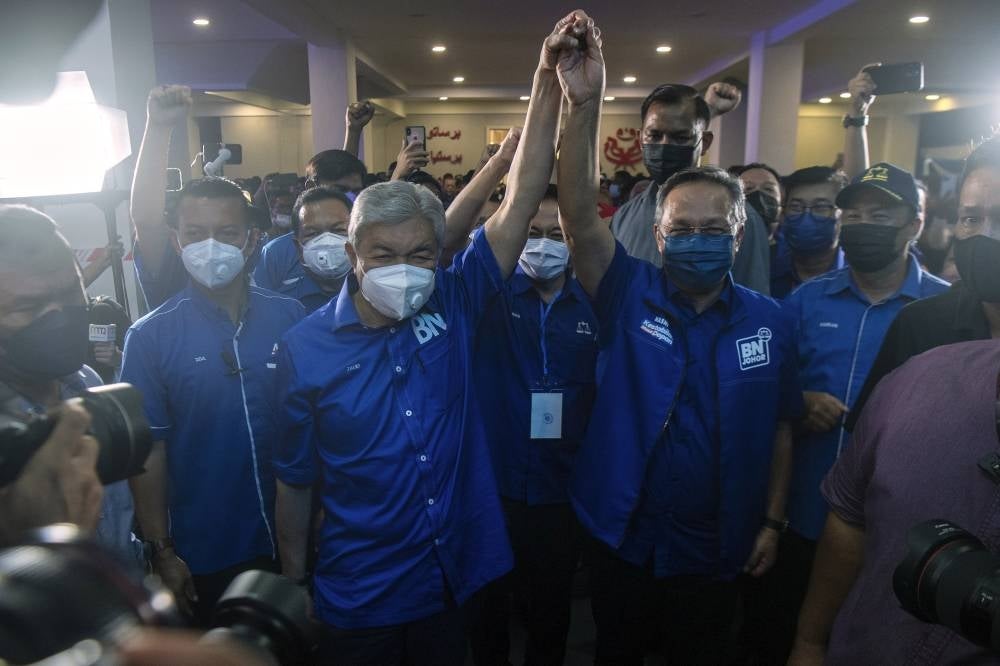What can we learn from the Johor state election…

There are many things that we can learn from the recent Johor state election that took place on Saturday.
The clearest and most significant outcome from Barisan Nasional’s (BN) 40-seat win from the 56 contested, was the total number of votes they obtained - a mere 599,753 out of 1,426,573 votes cast.
Based on percentage, only 43.11 per cent of voters supports or voted for BN while 56.89 per cent had voted for other parties.
From this amount, the total number of votes garnered by all other parties contesting were 826,820.
Overall, 54.92 per cent of the 2,599,797 eligible voters had gone to vote - this is the lowest voter turnout in any state election.
We do not know what would the trend or results be if the number of voter turnouts was higher as there are still 1,173,224 voters that did not cast their votes.
Who knows? Younger candidates or even Muda representatives could have won with a huge majority from this group.
Regardless, no matter how many popular votes Muda obtains, they still can’t form a government as they only contested seven state seats.
Back to those who did not vote for BN, these numbers are extremely significant, especially in seats with three-cornered fights or more.
It means that if the non-BN votes were put together in one basket, the BN candidates would have lost.
In simple terms, it can be said that BN is the main loser in their own winnings.
What Pejuang President Datuk Seri Mukhriz Mahathir said was right, BN and Umno should not be too proud of their results because the voter turnout does not reflect the true numbers of the people or Bangsa Johor as a whole.
BN should not be too happy or proud of the win because the number of votes obtained by their opponent was way more.
If you do the math, if it was a one-on-one fight, BN would have suffered tremendously.
On the other hand, there was no single party that managed to get more or the same amount as BN, as the non-BN votes were split amongst other parties.
This made BN the champion as their voters were solid and were not split in any way.
It would have been different if everyone entered the election as one - the only entity fighting against BN, which in this case - and based on Saturday’s result pattern - would see BN losing.
In Malaysia, the voting system is not the system as those practiced in Indonesia, the Philippines or the United States where voters can choose the president, where all the votes are obtained by a district or state level and the person who gets the most votes or popular votes will win.
The Malaysian system is different. We have representatives in the state assembly and Parliamentary level who are elected by eligible voters.
From there, we need to choose the candidates contesting for the seat.
The party or candidate who wins the seat will then be accumulated with other members of the same party.
With the right number of wins, the party will have the right to form a government.
If the number of seats by any party does not fulfill the basic requirement for a simple majority, thus whoever is capable to form a coalition with a strong majority, will be given the right to form a government.
If this happens, the coalition with the most seats will be asked to form a government, not the party with the most seats.
The party that has the veto power to form a government is the party with the most seats and is not challenged by other parties as what was achieved by BN when they won 40 seats in the recent state election.
This means in the Malaysian context, even though BN only garnered 43.11 per cent of the popular vote, which is a far lower number compared to its competitors but from the aspect of seats, they have won more compared to their opponents because the votes that did not go to BN, were split, which in turn have attributed to BN forming the government because that is the system that we use.
What was counted is the most number of seats obtained, not the percentage of popular votes.
In a state constituency, there could be one million voters but the candidate that won only represents one seat, not the percentages of votes he garnered.
So BN opponents or analysts can go back and forth, shouting that BN did not win the popular vote but the popular vote system is not used in our electoral system.
Popular votes do not form our government. The number of seats is what determines the formation of a government.
Are other parties that compete with BN do not understand this scenario? Of course, they do and are fully aware.
Then why hasn’t there been a more determined or strategic effort to ensure only one coalition is formed to challenged BN?
They have done that for GE14 and we all know how that ended. The government fell within 22 months. The prime minister has changed three times.
And what is certain, BN would be the most determined to push for a general election now.
Who could blame BN as they have tasted sweet victory once again.
"Back and Forth" is a column by Rozaid Rahman. He is Sinar Karangkraf Group Editor-in-Chief and Chief Content Officer.












